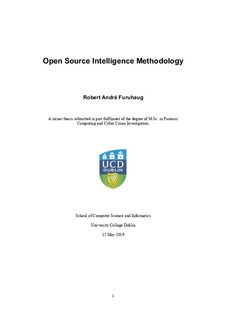Open Source Intelligence Methodology
Master thesis
Published version
Permanent lenke
http://hdl.handle.net/11250/2617479Utgivelsesdato
2019Metadata
Vis full innførselSammendrag
In the role of policing, access to information is crucial, whether there is an investigation of an offence or intelligence-led investigation to prevent crime. More and more traces are left online with the increased use of digital devices and a lot of people’s social life is online. More and more of this information is widely open on the internet and could be retrieved for investigative use, but to which extent is the police capable to use the potential in open source information from the internet?
When police officers understand the potential of online open source information and get the knowledge to find it, how will they do this? Are ordinary investigative principles adaptable for retrieving information and evidence from the internet?
The knowledge of tools and search operators in not enough to perform open source intelligence in most cases. There is a need for a strategy, planning and preparations before starting to gather information that takes into account a chain of custody as well as operational security and validation of the results. Furthermore, analysis of the gathered information is necessary to get intelligence out of the information.
The aim of dissertation is to describe a methodology for Open Source Intelligence on the internet that fulfil the demand for the police based on established principles and recommendations. The main approach is to review existing knowledge about principles, standards and methods from intelligence in general and investigation of digital evidence to see how existing models cover the requirements in a process for police use.
The result is a methodology presented in a model that will describe the open source intelligence process from a principal’s view and from the executive’s view.
Beskrivelse
Degree of M.Sc. in Forensic Computing and Cyber Crime Investigation
